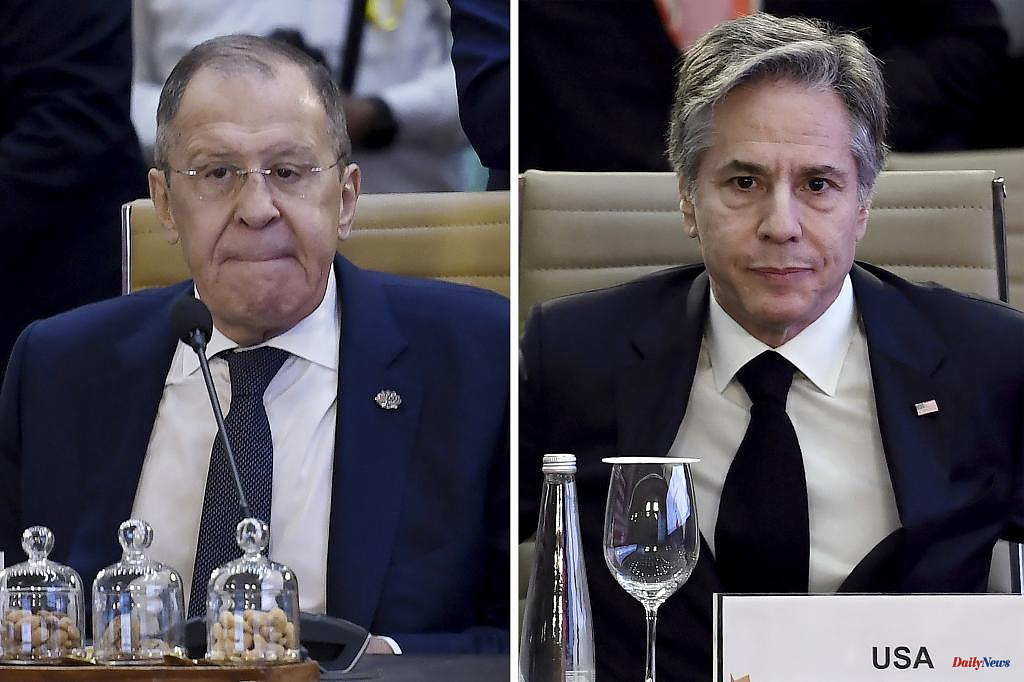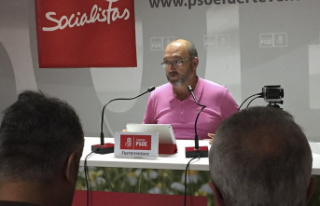The United States and Russia have had a face-off on neutral ground. The White House flag was held by the US Secretary of State, Antony Blinken, and the Kremlin flag by Foreign Minister Sergey Lavrov. The scenario, a G-20 summit in India, a country that maintains a strong alliance with both actors and that has not yet condemned the Russian invasion of Ukraine.
It has been the US side that has made public this first high-level meeting, albeit very brief, barely 10 minutes, between the two countries facing the war in Ukraine in the background. Although both had met in previous international summits, such as the G-20 in Bali last year, it is the first time that Blinken and Lavrov have seen each other since January 2022, a month before Moscow launched the invasion.
According to the AP agency, a senior Washington official said that Blinken took advantage of the discussion to make three basic points clear to Lavrov: that the United States would support Ukraine in the conflict for as long as it takes to end the war, that Russia should reverse its decision to suspend its participation in the New START nuclear treaty and that Moscow should release former Marine Paul Whelan, detained in Russia in 2018 on charges of espionage.
From Moscow they have not commented so far on the content of the meeting, only their Foreign Affairs spokesperson, Maria Zakharova, has pointed out that it would have been Blinken who has requested to speak with Lavrov. A meeting that would have taken place in the break after the first part of the G-20 foreign ministers' session on Wednesday, when the delegations have time to hold meetings on the sidelines of the summit.
India is leading the charge this week on the global diplomatic agenda. The giant from South Asia, which presents itself as the largest democracy in the world and which dances equally with the United States and Russia, has won the rotating presidency of the G-20 this year. Its role as a neutral power, with more and more weight on the geopolitical table, positions it as an opportune host to shelter the emissaries of almost all the protagonists of the scenario that focuses all eyes, the war in Ukraine.
New Delhi tried to give priority to other debates on food security or humanitarian assistance on the summit agenda, but the diplomatic chiefs of the Western powers took advantage of the fact that Lavrov was in front of them to demand that their country end the invasion.
"We must continue to ask Russia to end its war of aggression and withdraw from Ukraine for the sake of international peace and economic stability," Blinken stressed, who also took advantage of the presence of the Chinese Foreign Minister, Qin Gang, to urge Beijing not to provide military support to Russia. "(China) cannot publicly present itself as a peacekeeping force as long as, in one way or another, it continues to fan the flames of the fire that Vladimir Putin lit," Blinken said.
Addressing the Russian minister directly, his German counterpart, Annalena Baerbock, also called for an end to the attack by Putin's army. "It's good that I'm here in the room to listen. Stop the war. Not in a month or a year, but today," Baerbock said. "Unfortunately, one member of the G-20 prevents the other 19 from focusing all their efforts on these issues for which the G-20 was created. What unites us all is that there is not one place in the world where war Russian has had positive consequences", declared the German.
The Russian media pick up Lavrov's response during his speech, which accused the West of "turning the work on the G-20 agenda into a farce." Putin's envoy, trying to curry favor with countries in the global south, pointed out that it was his rivals - again pointing to the West - who had halted the flow of Ukrainian grain from Black Sea ports to developing countries that They face a food shortage.
In New Delhi Antony Blinken, Sergey Lavrov and Qin Gang have coincided, who debuts the position in international forums of this magnitude. To them, especially, was addressed the recorded speech that Indian Prime Minister Narendra Modi released this Wednesday to open the G-20 meeting of foreign ministers.
"We must all recognize that multilateralism is in crisis. The experience of recent years - financial crisis, climate change, pandemic, terrorism and wars - clearly shows that global governance has failed," Modi said. "We meet at a time of deep global divisions. We have a responsibility to those who are not in this room. We must not let the problems we cannot solve together get in the way of those we can."
The prime minister said that no group could claim world leadership without hearing from those most affected by its decisions. "We must focus on what unites us, not what divides us," he continued.
"After years of progress, today we risk falling back on the sustainable development goals. Many developing countries are struggling with unsustainable debt while trying to ensure food and energy security. They are also the most affected by global warming caused by the richer countries. That's why India's G-20 presidency has tried to give a voice to the global south."
These were the words of the leader of the world's fifth largest economy that is on the verge of, if it has not already achieved, becoming the most populous country in the world, above China. To find any dart aimed directly at the Russian invasion of Ukraine, it was necessary to wait for the Indian minister, Subrahmanyam Jaishankar, to speak after Modi's intervention, who pointed out that "respect for sovereignty and territorial integrity are guiding principles essential in international cooperation".
A hint at Moscow from a country that has not yet roundly condemned Putin's attack and that has spent a year inflating itself to buy Russian oil at a discount, evading international sanctions, while continuing to maintain a strong alliance with Washington , who is interested in stretching ties with India to counter the growing power of China.
In addition to the ministers of the 19 richest nations in the world, plus Josep Borrell representing the European Union, up to 40 delegations have gathered in New Delhi. Countries such as Egypt, Nigeria, Singapore, the United Arab Emirates or Spain have been invited to this meeting that had its aperitif on Tuesday night with a welcome dinner where neither Blinken nor the Chinese minister was present.
The one who did attend was the Russian Lavrov, who sat at the table, at the request of the Russian Embassy in New Delhi, next to the delegation of the United Arab Emirates and other invited countries from East Asia. Lavrov, apart from the official meeting, also held meetings with his Indian, Brazilian and Turkish counterparts. With the latter, Mevlüt Çavusoglu, as reported by the Ankara media, the meeting revolved around a future agreement for the export of Ukrainian grain.
"I am sure that India's diplomatic ability will be used to make Russia understand that this war has to end," Borrell, the EU's foreign policy chief, said in an interview with local media before the meeting began. on Wednesday.
This new G-20 meeting is being held just a few days after the bloc's finance ministers met in the Indian city of Bangalore and failed to reach an agreement to condemn with one voice the Russian attack on Ukraine. The group gave up, as happened in the previous meeting in Bali in November, to issue a joint statement due to lack of unanimity on two of the 20 points they put on the table. Russia and China opposed signing lines such as that the G-20 "condemns in the most generic terms the Russian aggression against Ukraine and demands its full and unconditional withdrawal from Ukrainian territory."
According to the criteria of The Trust Project












